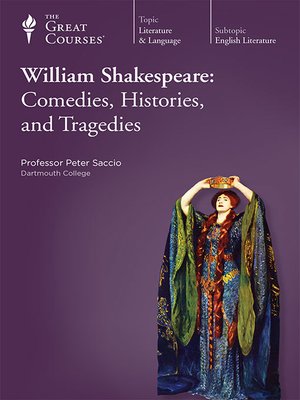
Sign up to save your library
With an OverDrive account, you can save your favorite libraries for at-a-glance information about availability. Find out more about OverDrive accounts.
Find this title in Libby, the library reading app by OverDrive.



Search for a digital library with this title
Title found at these libraries:
| Loading... |
Shakespeare's plays - whether a comedy like A Midsummer Night's Dream , a history like Henry IV , or a tragedy like Hamlet - are treasure troves of insight into our very humanity. These 36 lectures introduce you to Shakespeare's major plays from each of these three genres and explain the achievement that makes him the leading playwright in Western civilization. As you'll see, the key to Shakespeare's massive achievement is his "abundance," according to Professor Saccio; not only in the number and length of his plays but in the variety of experiences they depict, the multitude of actions and characters they contain, the combination of public and private life they deal with, and the richness of feelings they express. All the major plays are here for you to dive into, explore, and enjoy: The Taming of the Shrew (with its realistic look at bourgeois marriage customs), Measure for Measure (which shows Shakespeare breaking out of comic conventions), Richard III (the source of one of the Bard's most entertaining and frightening historical villains), Henry V (which raises questions about the morality of warfare), Macbeth (with its piercing look into the consciousness of a man hungry for power), and more. As the richness of each of these and other plays is revealed, you'll also touch upon the far-ranging philosophical and theological implications behind them. By the last lecture, you'll have a true understanding of why these comedies, histories, and tragedies endure even to this very day.






